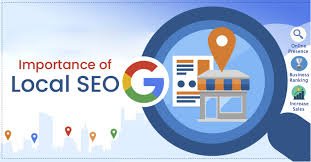In today’s competitive digital world, Local SEO sumosearch.io is crucial for small businesses aiming to attract local customers. With the rise of smartphones and location-based searches, businesses that invest in Local SEO have a better chance of appearing in search results when people search for products or services nearby. Optimizing for Local SEO not only increases visibility but also drives targeted traffic to your business.
What is Local SEO?
Local SEO is the process of optimizing your website and online presence to attract more business from relevant local searches. These searches usually have specific geo-based keywords, like “plumber near me” or “restaurants in [city].” Search engines use signals such as location, keywords, reviews, and business categories to determine which businesses appear in local search results.
Why Local SEO is Essential for Small Businesses
Local SEO is essential for small businesses because it helps them stand out in their community and attract local customers. With the majority of consumers using search engines to find local businesses, it’s important to be visible in local search results. Local SEO helps businesses rank for location-based searches, making it easier for potential customers to find them.
Small businesses benefit from Local SEO as it connects them to customers who are actively searching for the products or services they offer. Since most local searches lead to in-store visits, optimizing for Local SEO is a powerful way to drive foot traffic to your business.
How Search Engines Rank Local Businesses
Search engines prioritize businesses based on several factors when ranking local results. One of the most important factors is proximity to the searcher. The closer your business is to the person searching, the more likely you will appear in their local search results. Other key factors include:
- Relevance: How well your business matches the searcher’s intent.
- Prominence: How well-known and authoritative your business is, including reviews and online reputation.
- Consistency: Having consistent business information, such as name, address, and phone number (NAP), across all platforms.
Optimizing Your Google My Business Listing
One of the most effective ways to improve Local SEO is by optimizing your Google My Business (GMB) listing. GMB is a free tool provided by Google that allows businesses to manage how they appear in local search results, including Google Maps. Make sure to provide accurate business information, including hours, services, and photos.
Additionally, encourage your customers to leave reviews, as positive reviews can boost your business’s visibility and credibility in local search results.
Local SEO Keyword Strategies for Small Businesses
Using the right keywords is essential for Local SEO success. Focus on location-specific keywords that people are likely to use when searching for businesses in your area. For example, instead of just targeting “pizza delivery,” try “pizza delivery in [city name].” Using geo-targeted keywords in your content, meta descriptions, and tags will help your business rank higher in local searches.
The Role of Reviews and Ratings in Local SEO
Customer reviews and ratings are a significant factor in how search engines rank local businesses. Positive reviews not only improve your reputation but also signal to search engines that your business is trustworthy. Using Employee Monitoring Software can help ensure high-quality customer service, which in turn leads to more positive reviews. Encourage satisfied customers to leave reviews on platforms like Google, Yelp, and Facebook to boost your local ranking.
Search engines take into account the number of reviews and the average rating when ranking local businesses. Therefore, maintaining a high rating and encouraging new reviews should be a key part of your Local SEO strategy.
Building Local Backlinks
Backlinks from other local websites are valuable for improving your Local SEO. These backlinks act as endorsements, showing search engines that your business is well-connected in the community. Try to build relationships with local bloggers, newspapers, and community organizations to earn backlinks. Additionally, sponsoring local events or participating in community activities can help generate these links.
Consistency in NAP (Name, Address, Phone Number)
Consistency is key when it comes to Local SEO. Ensure that your business name, address, and phone number (NAP) are the same across all online platforms, including your website, social media profiles, and online directories. Any discrepancies can confuse search engines and hurt your local ranking.
By maintaining consistent NAP information, search engines will better understand your business and its location, which increases your chances of appearing in local searches.
The Importance of Mobile Optimization for Local SEO
With more people using mobile devices to search for local businesses, Web Design and mobile optimization are essential for Local SEO. Your website should be mobile-friendly, load quickly, and have easy-to-read text. A poor mobile experience can drive potential customers away and negatively affect your local rankings.
Most local searches happen on mobile devices, so it’s critical to ensure that your site is responsive and provides a seamless experience for users on the go.
Conclusion
Local SEO is crucial for small businesses to attract local customers and stay competitive. By optimizing for local search, small businesses can increase their visibility, improve rankings, and connect with more customers in their area. Whether it’s optimizing your Google My Business profile, building local backlinks, ensuring NAP consistency, or utilizing Revo Technologies to enhance digital marketing strategies, investing in Local SEO is a long-term strategy.







